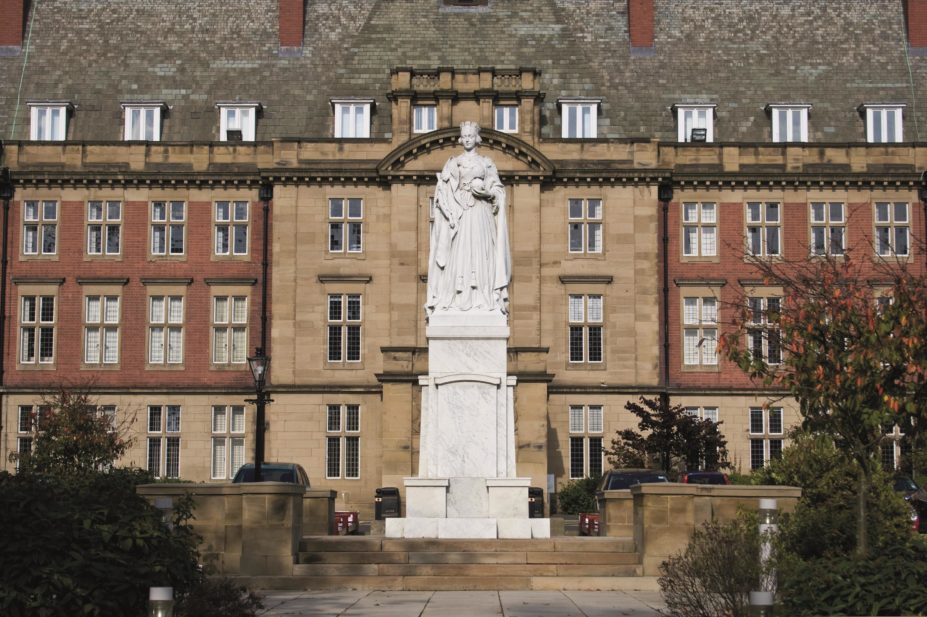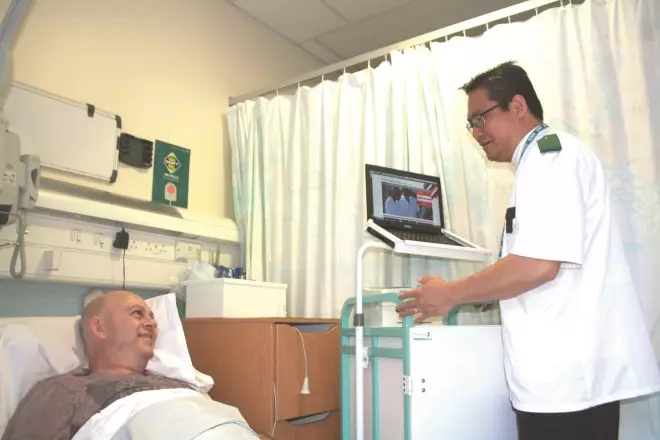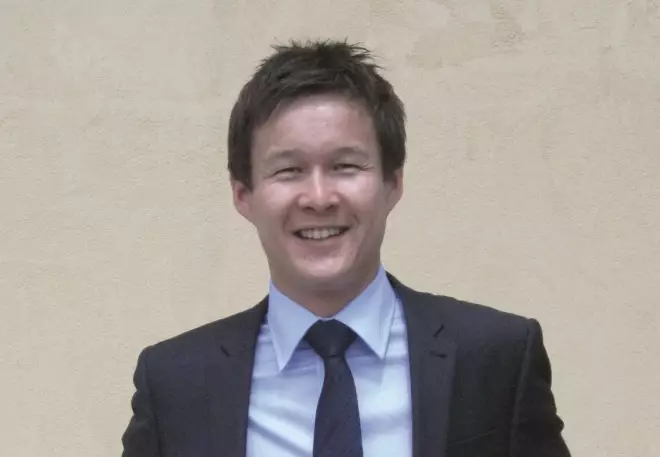
Ian Canham / Alamy
An initiative to refer hospital patients electronically to community pharmacies for post-discharge medicines reviews to avoid readmissions has made almost 1,200 referrals in its first year and could expand further across North East England.
The ‘Transfer of care’ scheme, a joint project between Newcastle-upon-Tyne Hospitals NHS Foundation Trust and North of Tyne local pharmaceutical committee (LPC), was initially launched in two hospitals and 211 local pharmacies in the area in July 2014.
The system has recently been extended to nearby Teesside through the University Hospital of North Tees and local pharmacies and being rolled in the North East and Cumbria. There are over 700 community pharmacies in the North East, meaning the scheme has the potential to treble in size if talks are productive.

Source: Newcastle University
Member of the pharmacy team refers a patient to community pharmacy before discharge
The scheme is featured as a case study in the Royal Pharmaceutical Society’s (RPS) ‘Hospital referral to community pharmacy’ guide, published in December 2014. Heidi Wright, RPS practice and policy lead for England, says: “
The transfer of information from hospital to community pharmacies about a patient’s medic
ines, particularly where changes have occurred, will help support patients to get the
most from their medicines.”
“We know when patients move between care settings there are often unintended discrepancies in patients’ medicines after discharge from hospital affecting up to 87% of patients. Both the new m
edicine service (NMS) and post-discharge medicines u
se reviews (MURs) can be used to provide a seamless care pathway for patients who transfer from hospital to the community setting. Community pharmacists can play a much bigger role in supporting patients with their medicines if
they have the right information to work with.”
Reducing harm
Since the programme launched, 1,189 patients have been referred for a post-discharge review and 41% have taken up the offer.
Non-compliance is a major cause of hospitalisation among patients with chronic diseases and around a fifth of patients discharged from hospital experience adverse drug events.
In the project,
pharmacists at
the Freeman Hospital and the Royal Victoria Infirmary
use a newly designed module in the PharmOutcomes web application to refer discharged patients to a local community pharmacy.
Patient information — including date of birth, postcode, NHS number, GP details and the discharge medicines list — is sent electronically.
The pharmacy contacts a
patient within three days to arrange a medicine use review or new medicine service consultation on the pre
mises.
The community pharmacists’ review aims to improve patients’ awareness of changes to medicines during the hospital stay, and educate them on how and when to take their medicines and any side effects. The community pharmacist can also refer patients to public health services, such as smoking cessation, or call the referring hospital pharmacist to discuss a patient’s care.
The outcome of this review is fed back to the hospital, detailing interventions made, advice provided or changes to treatm
ent for future reference.
Organisers say the interventions offered during the programme so far include correcting any misunderstanding about how to take medicines, discussing why patients’ medicines had changed and improving pain control.
Pharmacists are now being asked to score the likelihood of readmission had they not intervened. In an early sample, 5 of 70 scores provided estimated that a readmission may have occurred without a review.
‘A real win’

Andre Yeung: scheme increases community pharmacy engagement with MURs
Andre Yeung, now a pharmacy adviser for Newcastle City Coucil and a part-time pharmacy consultant for North of Tyne LPC when involved in the scheme, says the service is “groundbreaking” on account of the combination of the high volume of patients seen compared with other schemes and the user-friendly nature of the IT platform.
The initiative needed changes to PharmOutcomes and basic administration of the community pharmacies but, for the moment, the service requires no additional funding beyond the national MUR/NMS framework, he says.
Yeung says the project uses MURs that community pharmacists are already providing on a daily basis to greater effect. “What we’re doing is just informing pharmacy teams — and this is what pharmacists have wanted to know for a long time — which patients are in most need of the MURs in a consistent and user-friendly way,” he says.
“I think the service probably increases the engagement of community pharmacies in those MURs. No longer are they guessing which patients will need it. It’s a real win for them and for patients.”
The exchange of information creates valuable datasets for the hospital to potentially track whether patients’ readmission rates are affected and for the LPC to assess the completion rates of MURs conducted, he says.
Yeung adds that the numbers involved showed there was “enormous capacity” to expand referrals to community pharmacy by the NHS. Pharmacies in the north east, for example, could easily take referrals from NHS 111 for “tens of thousands” of minor ailment interventions each year, he says.
Neil Watson, clinical director of pharmacy and medicines management at Newcastle-upon-Tyne Hospitals NHS Foundation Trust, says the links will ensure safer transfer of patient care. “I have little doubt that by embedding such communication into our routine practice, this will improve patient experience and outcomes, key principles of medicines optimisation.”
Jean Banks, chair of North of Tyne LPC, says: “Understanding what patients do with their medicine on leaving hospital and reinforcing the messages in the community setting through the NMS and MURs that are given on discharge can only support patients to take their medicines effectively.”
Durham University plans to publish an analysis of the project.
- On 23 July at 11.45, this story was updated to correct several inaccuracies. We had originally misreported that discussions were ongoing to roll out the project when, in fact, a roll out is already underway. We also gave the wrong number of pharmacies in the North East, an incorrect score of the early sample and the wrong number of referrals in the project. Andre Yeung’s affiliation has changed since his involvement in the project and Durham University do plan to publish an analysis but not by August 2015. We apologise for these errors.

